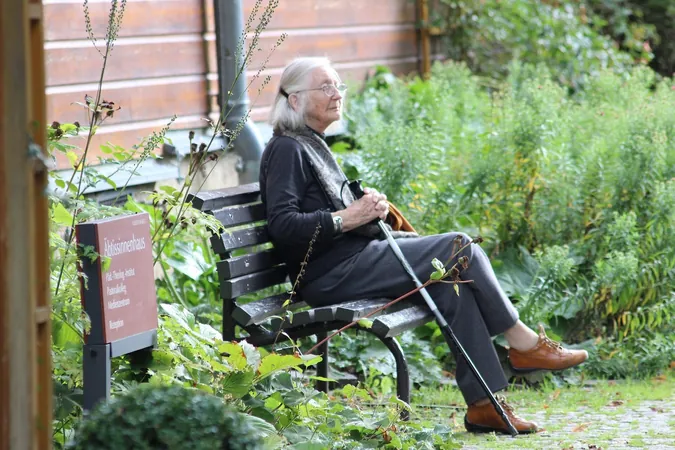
Shocking Global Findings: 20% of Dementia Patients Receive No Care!
2025-04-02
Author: Mei
A startling new study from the Yale School of Public Health has unveiled a grim reality for people living with dementia around the world as our population ages rapidly. Researchers found that a staggering one in five individuals suffering from this condition are receiving no assistance with daily activities—a situation that seems to have persisted for years.
The study, recently published in the prestigious journal *Nature Aging*, highlights that the failure to provide adequate care transcends national wealth and development status. “This isn't merely a caregiving issue; it’s a public health emergency,” declares Dr. Xi Chen, the paper's senior author and associate professor of public health at Yale. “The lack of basic caregiving not only increases the risk of hospital visits and nursing home admissions but can lead to depression and even premature death. This widespread neglect is placing immense pressure on families and healthcare systems globally.”
Research data was gathered from over 10,000 participants aged 50 and older across diverse nations, including the United States, England, 18 European countries, Israel, and China. This comprehensive study on dementia caregiving experiences is touted as the most extensive of its kind to date.
Drawing information from significant longitudinal surveys like the U.S. Health and Retirement Study and the English Longitudinal Study of Aging, the findings revealed that about 20% of dementia patients receive almost no formal support in their daily lives—regardless of whether they reside in wealthier nations or developing countries. Alarmingly, there has been no indication that this care gap has decreased from 2012 to 2018.
“What surprised us was the consistency of the findings across different countries,” noted Dr. Chen. “The lack of caregiving resources remains a daunting challenge that has lingered over the past decade, regardless of a nation’s level of development.”
Glaring Care Disparities
The study also illuminated significant gaps in both formal and informal caregiving services. Formal caregiving is defined as paid or professional care offered at home or in nursing facilities, while informal care encompasses assistance from family and friends.
In China, almost 99% of older adults with dementia reported receiving no formal care, while the United States was only marginally better, with 86% lacking formal support. Even countries in Europe with more robust social care systems showed troubling results, as over 70% of participants went without any formal assistance.
The informal care sector also raised red flags, as approximately 25% of individuals with dementia reported receiving no help from relatives or friends. The disparity in care is further amplified by socioeconomic status, with lower education levels correlating to a higher likelihood of inadequate formal support, leaving those living alone particularly vulnerable.
Dementia Care Costs Soaring
These findings come amidst a dramatic increase in the global population aged 65 and older. As of 2022, more than 55 million individuals worldwide were living with dementia, and projections estimate this figure will nearly double to 139 million by 2050.
Dementia encompasses various diseases that trigger a significant decline in memory and cognitive abilities, severely impacting daily life. While it predominantly affects older adults, it shouldn't be considered an inevitable part of aging.
In the U.S. alone, around 6.9 million people are currently living with dementia, creating extensive caregiving needs and healthcare costs that surpass those associated with other major health issues like heart disease or cancer. With long-term care expenses anticipated to soar to a staggering $360 billion in 2024—potentially reaching nearly $1 trillion by 2050—these trends underline the urgent necessity for reform in dementia care.
Time for Action
To bridge these alarming gaps in dementia care, a multifaceted approach is essential, according to Dr. Chen. This includes significant financial investments aimed at boosting access to professional caregivers, enhancing the support for informal caregivers, and recognizing the critical role cultural and demographic factors play in developing effective care solutions.
Dr. Chen urges policymakers to adopt effective and context-sensitive care models for dementia sufferers. “We need transformative policy changes, increased funding for formal care systems, and strategic support for informal caregivers,” he asserts. “Without immediate action, families will bear an even greater burden, and the fallout for senior citizens will be catastrophic.”
This groundbreaking study also included contributions from researchers Zhuoer Lin and Yuting Qian from the University of Illinois and Yale University, alongside experts from Yale and the World Bank, collectively emphasizing the global urgency of addressing dementia care needs.

 Brasil (PT)
Brasil (PT)
 Canada (EN)
Canada (EN)
 Chile (ES)
Chile (ES)
 Česko (CS)
Česko (CS)
 대한민국 (KO)
대한민국 (KO)
 España (ES)
España (ES)
 France (FR)
France (FR)
 Hong Kong (EN)
Hong Kong (EN)
 Italia (IT)
Italia (IT)
 日本 (JA)
日本 (JA)
 Magyarország (HU)
Magyarország (HU)
 Norge (NO)
Norge (NO)
 Polska (PL)
Polska (PL)
 Schweiz (DE)
Schweiz (DE)
 Singapore (EN)
Singapore (EN)
 Sverige (SV)
Sverige (SV)
 Suomi (FI)
Suomi (FI)
 Türkiye (TR)
Türkiye (TR)
 الإمارات العربية المتحدة (AR)
الإمارات العربية المتحدة (AR)